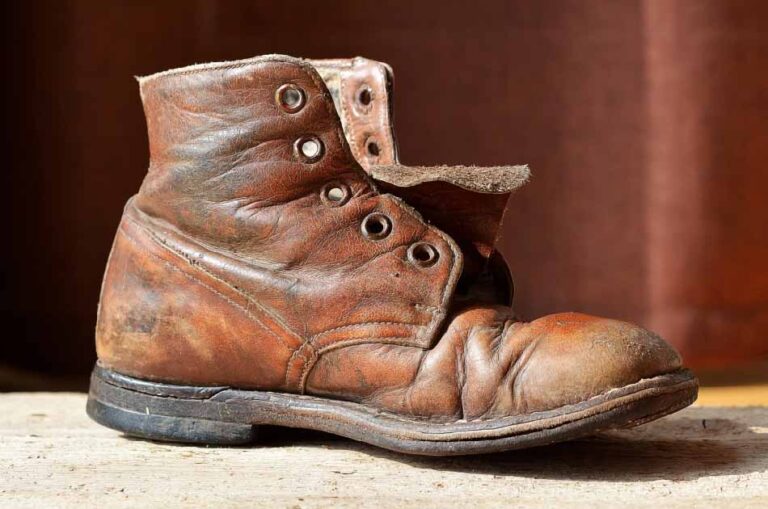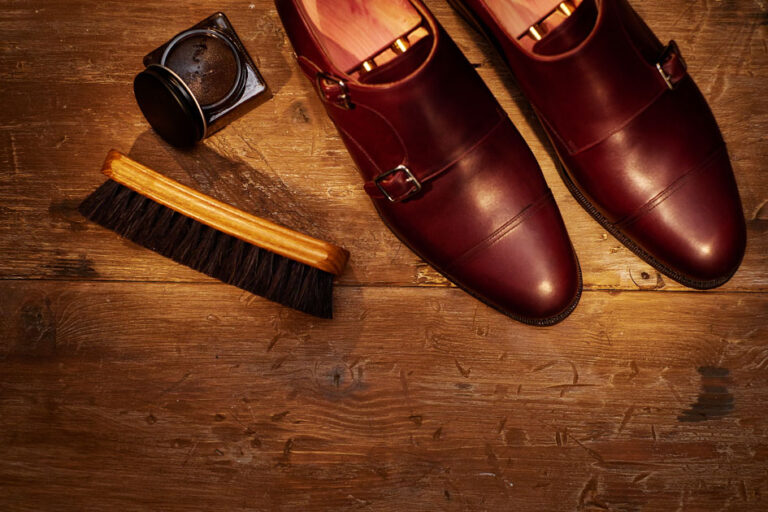Ever found your dress shoes lacking shine just when you need it? Don’t fret! Discover how to polish shoes without shoe polish using everyday items, right here.
Let’s dive into the world of DIY shoe care and keep those shoes sparkling!
Why You Might Need to Polish Shoes Without Shoe Polish
In the world of men’s dress shoes, a good shine can make all the difference. But what if you find yourself without any shoe polish? Here are some reasons why you might need to polish your shoes without using traditional shoe polish:
Looking for Alternatives
You’ve just realized that your shoe polish tin is as empty as a politician’s promises during election season. Or maybe you’re somewhere shoe polish isn’t readily available, like on a camping trip or at a hotel.
In a Hurry
You’re about to step out for an important event or meeting, and your shoes are looking duller than a cloudy day. You need a quick fix to make your shoes look presentable.
Environmentally Conscious
Traditional shoe polish can contain chemicals that aren’t exactly eco-friendly. If you’re someone who cares about Mother Earth as much as you care about your footwear, you might be looking for natural alternatives.
Budget-Conscious
Why spend money on shoe polish when you can use items commonly found around the house? If you’re watching your pennies, this could be an attractive option.
Curious
Maybe you’re just someone who loves to learn new things. Exploring alternative methods of shoe care could be an interesting experiment!
So, whether it’s necessity, curiosity, or a desire to be more eco-friendly, there are plenty of reasons to learn how to polish shoes without shoe polish. Let’s explore some of these methods next!
The Science Behind Shoe Polishing
Before we dive into the alternatives, let’s take a moment to understand why we polish our shoes in the first place.
The Magic of Shoe Polish
Traditional shoe polish works by filling in the tiny scratches and scuffs on the surface of the leather, creating a smooth, shiny finish. It also conditions the leather, keeping it soft and preventing it from drying out and cracking.
But here’s the kicker: shoe polish isn’t the only thing that can do this. Many household items can mimic these effects, giving your shoes that sought-after shine.
The Role of Oils
Many natural oils, like olive oil and coconut oil, have properties that make them excellent alternatives to shoe polish. They can penetrate the leather, conditioning it and giving it a nice shine. Here’s how to polish shoes without shoe polish. Plus, they’re all-natural, which is a big win for our eco-conscious shoe lovers!
The Power of Fruits
Believe it or not, some fruits can also help shine your shoes. The inside of a banana peel, for example, contains oils and potassium which can give your shoes a quick shine. Talk about a fruitful endeavor!
Quick Fixes with Household Items
Some common household items like rubbing alcohol and petroleum jelly can also be used to shine shoes. They might not condition the leather as well as oils or traditional polish, but they can certainly give your shoes a quick shine when you’re in a pinch.
So there you have it! The science behind shoe polishing isn’t as complicated as you might think.
With a little creativity and some common household items, you can keep your shoes looking sharp without traditional shoe polish.
Natural Alternatives to Shoe Polish
Now that we’ve covered the science behind shoe polishing, let’s get into the nitty-gritty of natural alternatives. These methods are not only effective but also eco-friendly and budget-friendly. So, let’s get started!
Olive Oil: The Mediterranean Secret
Did you know that olive oil isn’t just for cooking? This versatile oil can also give your shoes a nice shine. Here’s how:
- Clean your shoes with a damp cloth to remove any dirt or dust.
- Apply a small amount of olive oil to a soft cloth.
- Rub the cloth over the surface of the shoe, making sure to cover all areas.
- Allow the oil to soak in for a few minutes, then buff with a clean, dry cloth.
Voila! Your shoes will be shining like a Greek god in no time.
Banana Peel: A Fruitful Shine
Next time you eat a banana, don’t throw away the peel! The inside of a banana peel can be used to shine your shoes. Here’s how:
- After eating a banana (yum!), take the inside of the peel and rub it all over your shoe.
- Use a circular motion to make sure you cover all areas.
- Let it sit for a few minutes, then buff with a soft cloth.
Your shoes will be so shiny; you might start slipping on peels yourself!
Coconut Oil: Tropical Shine
Last but not least, coconut oil is another great alternative for shoe polish. Not only does it give your shoes a nice shine, but it also conditions the leather, keeping it soft and supple. Here’s how:
- Clean your shoes with a damp cloth.
- Apply a small amount of coconut oil to a soft cloth.
- Rub the cloth over your shoes, making sure to cover all areas.
- Allow the oil to soak in for a few minutes, then buff with a clean, dry cloth.
Your shoes will be shining brighter than a tropical sunset!
So there you have it! Three natural alternatives to shoe polish that are easy to use and kind to both your wallet and the environment.
Natural Alternatives to Shoe Polish
Now that we’ve covered the science behind shoe polishing, let’s get into the nitty-gritty of natural alternatives. These methods are not only effective but also eco-friendly and budget-friendly. So, let’s get started!
Olive Oil: The Mediterranean Secret
Did you know that olive oil isn’t just for cooking? This versatile oil can also give your shoes a nice shine. Here’s how:
- Clean your shoes with a damp cloth to remove any dirt or dust.
- Apply a small amount of olive oil to a soft cloth.
- Rub the cloth over the surface of the shoe, making sure to cover all areas.
- Allow the oil to soak in for a few minutes, then buff with a clean, dry cloth.
Voila! Your shoes will be shining like a Greek god in no time.
Banana Peel: A Fruitful Shine
Next time you eat a banana, don’t throw away the peel! The inside of a banana peel can be used to shine your shoes. Here’s how:
- After eating a banana (yum!), take the inside of the peel and rub it all over your shoe.
- Use a circular motion to make sure you cover all areas.
- Let it sit for a few minutes, then buff with a soft cloth.
Your shoes will be so shiny; you might start slipping on peels yourself!
Coconut Oil: Tropical Shine
Last but not least, coconut oil is another great alternative for shoe polish. Not only does it give your shoes a nice shine, but it also conditions the leather, keeping it soft and supple. Here’s how:
- Clean your shoes with a damp cloth.
- Apply a small amount of coconut oil to a soft cloth.
- Rub the cloth over your shoes, making sure to cover all areas.
- Allow the oil to soak in for a few minutes, then buff with a clean, dry cloth.
Your shoes will be shining brighter than a tropical sunset!
So there you have it! Three natural alternatives to shoe polish that are easy to use and kind to both your wallet and the environment.
How to Maintain the Shine on Your Shoes
Now that we’ve covered some great alternatives to shoe polish, let’s talk about how to maintain that fresh shine. After all, a good offense is the best defense!
Regular Cleaning
The first step to maintaining shiny shoes is regular cleaning. Dirt and dust can dull the shine of your shoes, so make sure to give them a good wipe down after each wear. A damp cloth should do the trick!
Proper Storage
Believe it or not, how you store your shoes can also affect their shine. Keep your shoes in a cool, dry place and avoid exposing them to direct sunlight. If you’re feeling fancy, you can even invest in a shoe tree to help maintain their shape.
Regular Polishing
While these quick fixes and natural alternatives are great, nothing beats regular polishing for maintaining the shine on your shoes. Whether you’re using traditional shoe polish or one of our natural alternatives, aim to polish your shoes at least once a month.
Quick Touch-Ups
Life happens, and sometimes your shoes might need a quick touch-up between polishes. That’s where our quick fixes come in handy! A little petroleum jelly or rubbing alcohol can quickly restore the shine to your shoes.
So there you have it! With these tips and tricks, your shoes will stay shiny and new for years to come. Now go forth and shine!
Conclusion
Well, there you have it! A comprehensive guide on how to polish shoes without shoe polish.
We’ve explored everything from the science behind shoe polishing to natural alternatives and quick fixes. We’ve even covered how to maintain that fresh shine on your shoes.
Remember, whether you’re using olive oil, a banana peel, or good old petroleum jelly, the key is regular care and attention. With these tips and tricks, your shoes will be the talk of the town!
So next time you find yourself without shoe polish, don’t despair. Just take a look around your house, and you’ll find plenty of alternatives. Who knew shoe care could be so fun and eco-friendly?
Now go forth, fellow shoe enthusiasts, and may your shoes always shine bright!
Frequently Asked Questions
Q: Can I use vegetable oil instead of olive oil to polish my shoes? A: Yes, you can. Vegetable oil can also give your shoes a nice shine. However, it might darken the leather, so test on a small area first.
Q: Can I use these methods on suede or nubuck shoes? A: No, these methods are not recommended for suede or nubuck shoes. These materials require special care.
Q: How often should I polish my shoes? A: It’s recommended to polish your shoes at least once a month. However, if you wear them frequently, you might need to do it more often.
Q: Can I use these methods on colored shoes? A: Yes, but always test on a small, inconspicuous area first as some methods might alter the color of the shoes.
Q: Are there any commercial alternatives to shoe polish? A: Yes, there are commercial products available that are eco-friendly and don’t contain the harsh chemicals found in traditional shoe polish.



